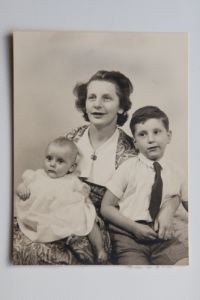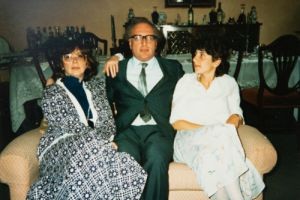My brother Lionel, died in January 2020 of acute myeloid leukaemia. Lionel was 70 when he died; for 68 out of his 70 years he had been supported tirelessly by my mother, who died in 2017 aged 94. My sister Liz and I only had to take full responsibility for Lionel’s wellbeing for the brief period between these two deaths. Whilst I know rationally that there is no scientific basis for this idea- sometimes I felt as if Lionel’s leukaemia had resulted from his blood rebelling at the prospect of living on Planet Earth without our mother.
Lionel missed our mother acutely; she’d been his anchor, and my sister and I with our busy lives stuffed full of children, grandchildren and work, struggled to fill the gap. Then, less than two years after mum’s death, Lionel received his diagnosis, and was given a prognosis of six to twelve months.
Looking After: A Portrait of My Autistic Brother is a memoir of his life. Following his death (which came a month or so before the first Covid lockdown) I thought a lot about the legacy that one leaves behind after one has died. Thinking about my own life, I imagine that I will be remembered by my children and grandchildren, and I will also leave a legacy in the form of other books I have written (Looking After is not my first book). But Lionel hadn’t had a partner or children, and he worked part-time in the post room for an autism charity – so these more obvious examples of legacy didn’t apply to his life. Yet I’d witnessed during his illness, how he touched the lives of so many people – how the nurses and doctors who cared for him came to appreciate his old fashioned manners, alongside his idiosyncrasies. On one occasion Lionel apologised to a nurse for talking to himself, and the nurse reassured him that she wasn’t bothered. She later told me that she’d like ‘a ward full of Lionels.’ That was the impact he could have on people. Not all people; sometimes his anxiety levels were stratospheric, and he could drive one demented by asking the same question again and again. But he definitely left his mark on the world, and many people cared about him deeply – a fact that I wanted to celebrate in writing the book.
Another reason for writing the book was that autism is so often portrayed as something that effects children and young people when the reality is that it is a condition that will impact on one’s first to one’s last breath. Almost nothing has been written about how best to support an autistic person through treatment for a disease like leukaemia; how to make the inherent uncertainty of treatment less aversive; how to manage the potential for sensory overload given the unfamiliar sights, sounds and smells of hospital. And how to talk about death.
As siblings, we are likely to be the people who support our disabled brothers and sisters at the end of their lives- if they haven’t had children of their own to care for them. My hope is that Looking After will spark a conversation on how best to carry out this final task.

Extract from Looking After: A Portrait of My Autistic Brother by Caroline Elton
It was a shock to step out of the quiet, dark room into the brightly lit corridor. I returned to the nurses’ station and found that one of the junior doctors was sitting at the desk.
‘Lionel’s really struggling to breathe,’ I told the doctor. ‘I think he needs more medication.’
The doctor looked up from the computer. ‘Giving more sedation could hasten his death,’ he replied.
‘I’m not asking you to hasten his death. I’m asking you to alleviate his suffering. And he’s really suffering at the moment. You can see it on his face.’
The doctor didn’t look delighted at my intervention, but he could hear the fierceness in my voice. I wasn’t going to move until he came and checked Lionel out.
We walked back down the corridor and into Lionel’s room. The doctor stood over Lionel for a minute or so, saw the laboured look on his face and noted the gravelly sounds of each breath.
‘OK,’ he said, and left the room, returning a minute later with a syringe. He picked up Lionel’s arm and injected the morphine into the wasted flesh just below the short sleeves of the hospital gown.
‘That should help,’ he said, before exiting the room.
We stayed glued to our seats.
Almost immediately after the injection, Lionel’s breathing eased and the muscles of his forehead relaxed.
From time to time, one of us would talk to him. ‘We’re still here,’ we told him. And ‘You’re so brave and uncomplaining, Lionel.’ And ‘Mum would be so proud of you.’
But most of the time we sat there quietly, time frozen, as we watched his life fade away. Over the next hour or so, his breathing grew shallower and shallower, with longer spaces between each breath.
We waited.
Then absolute silence.
After a moment, I stood up and put my hand on his chest. There was no movement.
‘I think he’s gone,’ I whispered to the others. ‘I’ll go and find one of the nurses or doctors.’
The nurse who had earlier confirmed the stroke came back into the room. She felt for a pulse and looked for any evidence of breathing.
‘Yes. He’s gone,’ she told us. Then she leant over his bed and kissed him gently on the forehead.
‘Good night, big man,’ she said, before quietly tiptoeing out of the room.
Liz stood up and followed suit. She bent down over Lionel and gave him another kiss on his forehead.
‘Good night, big brother,’ she whispered into his ear, before continuing: ‘I didn’t really feel that you were my big brother, until I got to know you at the end.’

- Order Looking After: A Portrait of My Autistic Brother by Caroline Elton from your local bookshop or Waterstones
- Read more about adult sibling bereavement